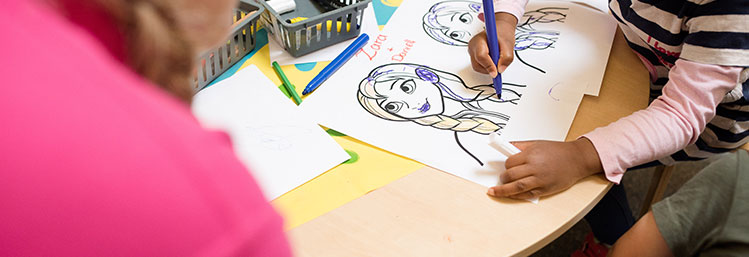
Working with Children, Young People and Families
BA (Hons)
- Typical offer for 2025
- Duration
- UCAS code
Suitable for applications.
Learning and assessment
You will explore the theoretical underpinnings of work with children and families, with a focus on synthesizing theory and practice. You will study communication, childcare law, modules in Sociology and Psychology, and will have the opportunity to develop practical skills in an optional Learning from Practice module in year 2.
You will undertake modules that explore the social policy and legislative backdrop in relation to children and families. You will explore issues around confidentiality, information sharing and interagency working. You will gain an understanding of the roles and responsibilities of agencies working with children and families including children’s centres, children’s social care, schools, the police and the health services.
Professionals in this field are encouraged to develop skills in direct work with children and families and you will be introduced to a range of practice skills and learn hands-on techniques to work with children including the use of play, art and role play. Throughout the three years of the degree, you will be encouraged to develop into a reflective practitioner.
This degree pathway is suitable for anyone already working with children and families, or for anyone leaving secondary education and wanting to start a career in working with children, young people and families.
Study support
Our comprehensive support services will help you to achieve your full potential – both academically and personally.
We provide all you need to make the very best of your time with us, and successfully progress through your studies and on into the world of graduate employment.
Our support services include:
- Personal tutors
- Disability services
- Counselling services
- MyBradford student support centres
- The Students’ Union
- Chaplaincy and faith advisers
- An on-campus nursery
- Halls wardens
We have well-stocked libraries and excellent IT facilities across campus. These facilities are open 24 hours a day during term time, meaning you’ll always find a place to get things done on campus.
Our Academic Skills Advice Service will work with you to develop your academic, interpersonal and transferable skills.
Research
All teaching staff are research active, and our research informs our teaching.
We bring a variety of experiences of children and families work including fostering and adoption, family and parenting support, child protection and childcare law.
We also bring a huge variety of other skills and expertise, including using art as a therapeutic tool with children and families and skills in other direct work activities.
